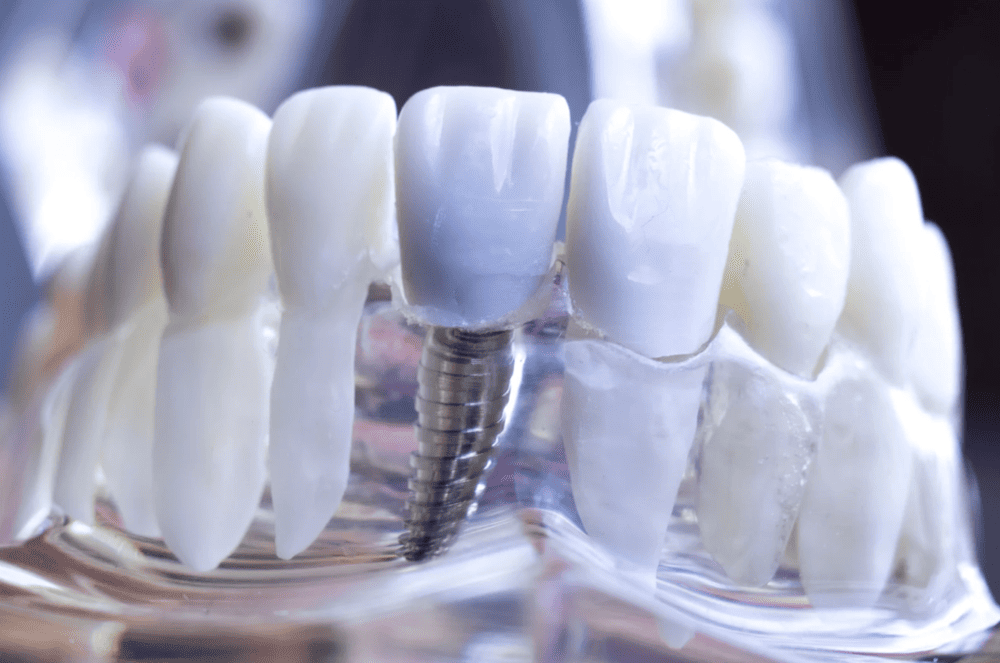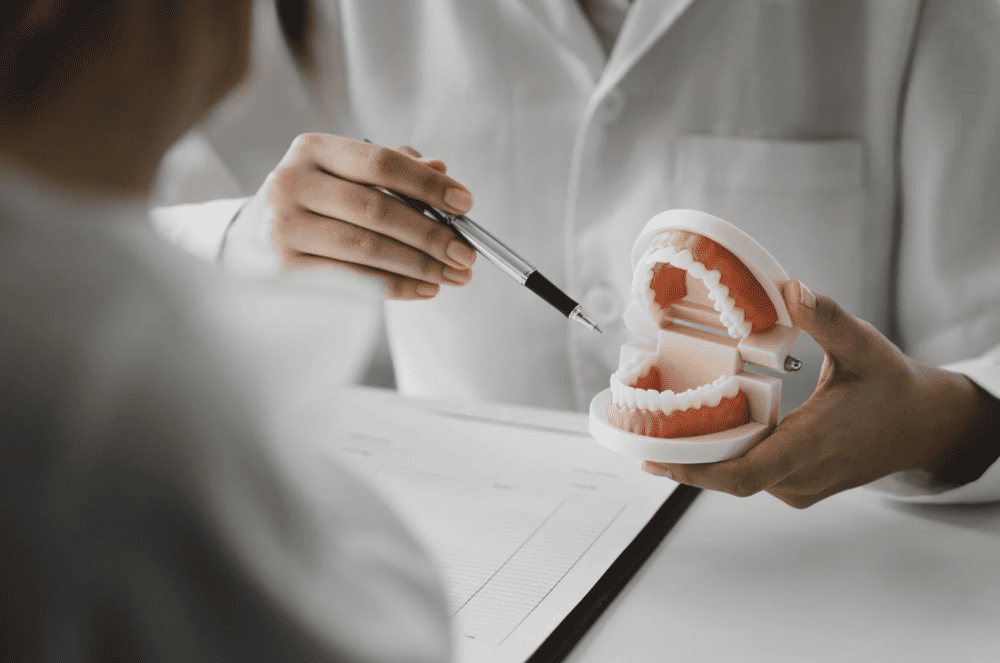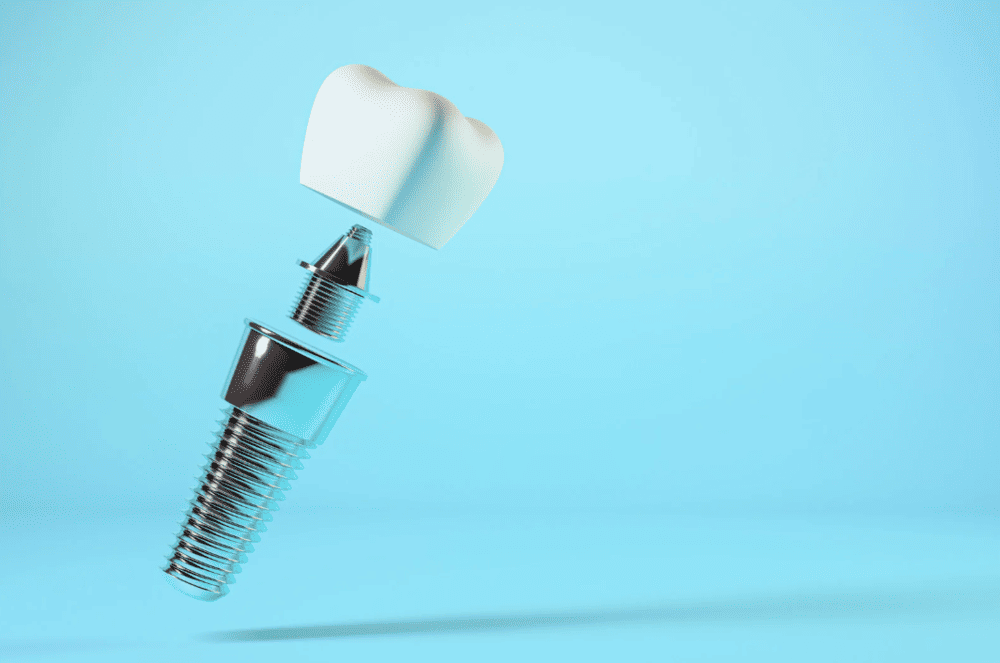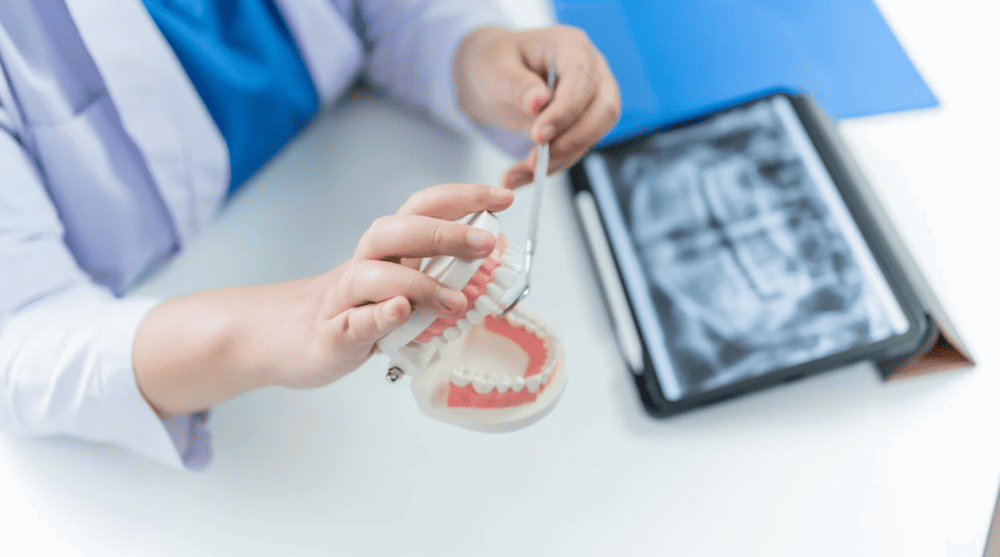
Dental Implant: Complete Guide to Implant Costs, Procedure and Potential Risks
Dental implants are a modern, reliable and natural-looking solution for replacing missing teeth. In this article, we’ll explain the implant procedure, cost, pre- and post-operative care tips, and potential complications—helping you decide whether dental implants are the right choice for restoring your smile and confidence.

What Are Dental Implants? Benefits and How They Work
Dental implants are a cutting-edge tooth replacement solution involving the surgical placement of a titanium artificial root into the jawbone. Once fused with the bone (a process called osseointegration), a connector (abutment) and a custom-made crown—often full porcelain—are attached, recreating a natural-looking tooth. Compared to bridges or dentures, implants offer superior stability, mimic real teeth aesthetically, and help preserve jawbone density, preventing facial sagging over time.
3 Key Benefits of Dental Implants
Natural Appearance
Crowns blend seamlessly with existing teeth.
Longevity
Success rates exceed 95%, lasting decades with proper care.
Bone Health
Stimulates jawbone growth, countering bone loss from missing teeth.

Am I a Candidate for Dental Implants? Detailed Assessment
Dental implants aren’t suitable for everyone, and candidacy depends on your oral health and overall condition. Below is a detailed evaluation to help you determine if implants are right for you.
Situations Where Dental Implants Are Ideal
Single or Multiple Missing Teeth
Caused by decay, gum disease, or trauma, implants restore full chewing function.
Discomfort with Dentures
If removable dentures slip, affecting eating or speech, implants offer a stable alternative.
Preserving Adjacent Teeth
Unlike bridges requiring healthy tooth grinding, implants preserve natural teeth.
Preventing Jawbone Atrophy
Prolonged tooth loss leads to bone resorption; implants stimulate bone regeneration.
Situations to Delay Dental Implants
Uncontrolled Systemic Conditions
Severe diabetes, osteoporosis, or healing-impaired diseases require stabilization first.
Heavy Smokers
Smoking over 20 cigarettes daily reduces osseointegration success; quit at least 4 weeks prior.
Recent Head/Neck Radiation
Radiation may affect bone healing; consult your oncologist for timing.
Active Oral Infections
Untreated gum disease or abscesses must be resolved before surgery.
*Unsure about your eligibility? Schedule a personalized assessment with our dentist to avoid delays.

Restore Your Smile with Dental Implants
At Smith & Jain Dentists, we offer dental implants for a permanent, natural-looking solution to missing teeth. Our expert team in Central, Hong Kong provides personalized care from consultation to recovery.
Why Choose Us?
- ✅ Customized Treatment – Tailored to your needs.
- ✅ Advanced Technology – Precise, comfortable procedures.
- ✅ Experienced Professionals – Trust us for top-quality care.
💡 Ready for a New Smile?

Dental Implant Costs: Factors Influencing Pricing
Dental implant costs vary depending on individual factors:
Implant Brand
Premium brands (e.g., Straumann, Nobel Biocare) cost more.
Bone Quality
Bone grafting for insufficient density increases expenses.
Procedure Complexity
Full-mouth All-on-4 implants are pricier than single implants.
Smith & Jain Dentists offers a comprehensive initial assessment for HKD $700 only, including clinical exams, medical history review, and 3D CBCT scanning. Post-assessment, we provide a personalized treatment plan and cost estimate for transparency. Contact us for the latest information!

Dental Implant Procedure – Step-by-Step Guide
Dental implant treatment is a precise and delicate procedure. To ensure safety and achieve optimal results, the process is typically carried out in several stages:
1. Initial Consultation & 3D Imaging
The journey begins with a thorough consultation. Your dentist will review your medical history, perform an oral examination, and arrange a 3D CBCT scan. This advanced imaging allows for precise evaluation of bone density, nerve positioning and adjacent teeth, helping to create a personalised and safe surgical plan.
2. Implant Placement Surgery
Under local anaesthesia (with optional mild sedation), the dentist will make a small incision in the gum and use specialised tools to drill into the jawbone. A titanium implant is carefully placed into the prepared site. The gums are then sutured for natural healing. The procedure usually takes 1 to 2 hours, and discomfort is generally manageable.
3. Healing Period (Osseointegration – Approx. 6 to 12 Weeks)
During this stage, the implant fuses with the surrounding bone in a process called osseointegration, forming a solid foundation for the crown. Patients are advised to avoid hard foods and follow post-operative care instructions, including medication, to support healing and prevent infection.
4. Abutment Placement & Impression Taking
Once the implant is stable, the dentist will remove the healing cap and attach an abutment (a connector between the implant and crown). An impression or digital scan of your teeth and bite will then be taken to design a crown that fits perfectly.
5. Final Crown Installation
Using the impression data, a skilled dental technician will craft a custom-made ceramic crown with natural aesthetics. The dentist will securely fix the crown onto the abutment, restoring both the appearance and function of your tooth.
6. Follow-Up & Long-Term Maintenance
During the first month, regular check-ups are recommended to monitor healing. Long-term care includes professional dental cleanings every 3 to 6 months and routine check-ups to maintain implant health, prevent gum disease, and ensure long-lasting results.

Pre- and Post-Implant Care: What You Need to Know
A successful dental implant procedure not only relies on the skill of the dentist and the quality of the equipment but also on the patient’s preparation before the procedure and the care taken after the procedure. Here are the important things to keep in mind before and after your implant:
Pre-Surgery Preparation
Comprehensive Oral Examination
Before the implant, the dentist will arrange a thorough oral examination and address any issues that may affect the success of the surgery, such as cavities, gum disease, or oral infections.
Full Disclosure of Health Conditions
Patients should inform the dentist about any systemic health conditions (e.g., diabetes, hypertension) and medications they are currently taking. This helps the dentist assess risks and make any necessary adjustments to the treatment plan.
Avoiding Unhealthy Habits
It is recommended to avoid smoking and drinking alcohol for at least 24 hours before the procedure. This helps reduce the risk of post-surgery infections and promotes better healing of the tissues.
Post-Surgery Care
Managing Discomfort and Swelling
Follow your dentist’s instructions for pain relief. Cold compresses can be applied to the affected area during the first 24 to 48 hours to reduce swelling and discomfort.
Maintain Good Oral Hygiene
During the first week after surgery, it is advisable to use an antimicrobial mouthwash to help clean the mouth. Avoid brushing the surgical area to prevent irritation or infection of the wound.
Adjust Your Diet
During the initial phase of recovery, consume soft or semi-soft foods such as soups and porridge. Avoid hot, hard, or spicy foods. As healing progresses, you can gradually return to a normal diet.
Regular Follow-Up Appointments
Attend all scheduled follow-up appointments to monitor the integration of the implant with the bone. Early detection of potential issues helps ensure long-term stability.

Potential Side Effects of Dental Implants
While dental implants are a well-established and highly successful procedure, there are still some risks and potential complications, as with any medical procedure. Understanding these risks allows patients to make informed decisions and recognise any abnormal symptoms early. Common Complications Include:
Post-Surgery Infection
If the surgical area is not kept clean or if the patient has a weakened immune system, a local infection may occur. Symptoms include persistent swelling, pus, and increasing pain. Prompt medical attention is necessary.
Failure of Implant Integration
In some cases, the implant may fail to integrate with the jawbone, a condition known as osseointegration failure. Factors such as insufficient bone quality, smoking, or poorly controlled diabetes may contribute to this. If this occurs, the implant must be removed, and a second implant may be placed after the bone stabilises.
Nerve Damage
In rare cases, during lower jaw implant procedures, nerves may be inadvertently affected, leading to numbness or tingling in the lip, chin, or tongue. Most nerve damage is temporary, but in a few cases, it may be permanent.
Gum or Soft Tissue Issues
Improper cleaning after surgery or poor gum health can lead to gum recession or peri-implantitis, an infection of the tissues surrounding the implant. Regular cleanings and good oral hygiene habits can significantly reduce this risk.
Implant Loosening or Crown Loss
Improper distribution of bite forces or habits such as biting hard objects may cause the implant or crown to become loose or fall off. If you notice any movement, it is important to visit your dentist for timely adjustments.
*Although these complications are rare, selecting an experienced dental team, ensuring thorough pre-surgery evaluations, and following proper post-surgery care can greatly reduce the risk of these issues, ensuring the long-term success and stability of your dental implant treatment.
Conclusion
Dental implants are widely recognized as a long-term solution for missing teeth, not only restoring chewing function and improving appearance but also helping to maintain healthy jawbone structure. However, a successful implant procedure is based on accurate personalized assessments, meticulous surgical techniques, and the patient’s active cooperation before and after surgery.
If you are facing tooth loss and are looking for a stable and natural restoration method, it is advisable to seek professional dental advice early. Through comprehensive clinical evaluations and imaging analysis, your dentist can create a suitable treatment plan, providing clarity on expected outcomes, procedural details, and cost arrangements.
Restore Your Smile with Dental Implants
At Smith & Jain Dentists, we offer dental implants for a permanent, natural-looking solution to missing teeth. Our expert team in Central, Hong Kong provides personalized care from consultation to recovery.
Why Choose Us?
- ✅ Customized Treatment – Tailored to your needs.
- ✅ Advanced Technology – Precise, comfortable procedures.
- ✅ Experienced Professionals – Trust us for top-quality care.
💡 Ready for a New Smile?
FAQs: About Dental Implant
Will dental implants be painful? Do I need to be hospitalized?
Dental implant surgery is typically performed under local anesthesia or mild sedation, and most patients do not experience significant pain during the procedure. Mild discomfort or swelling may occur post-surgery, which can usually be relieved with pain medication and cold compresses. This is an outpatient procedure, so no hospitalization is required, and patients can rest at home after surgery.
How long do dental implants last? Will they become loose?
If the implant successfully integrates with the bone and is maintained with proper oral care and regular check-ups, it can last for over ten years, possibly longer. Factors affecting implant stability include smoking habits, gum health, and the control of systemic diseases.
Is dental implant treatment suitable for everyone? Can elderly patients undergo this treatment?
As long as the bone structure is adequate and the overall health is stable, most adults are suitable candidates for dental implants. Age is not a strict limiting factor, as many elderly patients successfully undergo implants and regain normal chewing function. However, those with uncontrolled chronic conditions should undergo an individual risk assessment by a dentist.
How does dental implant treatment differ from bridges and dentures?
Implants are a fixed restoration solution that does not rely on adjacent teeth for support or require removal every day. They closely resemble natural teeth in appearance and function, and they help prevent jawbone resorption. Bridges, on the other hand, require the adjacent teeth to be filed down for support, while dentures may have less stability and comfort.
What if I have insufficient bone for a dental implant?
Insufficient bone does not mean you cannot have an implant. Advances in dental technology allow for bone grafting or artificial bone supplementation to rebuild lost bone structure and provide stable support for the implant. Whether such procedures are needed will depend on the evaluation by your dentist.
Disclaimer
All information provided on this website is for informational purposes only and is intended to help readers gain general knowledge about dental health. The content on this website should not be considered a substitute for professional dental diagnosis, advice, or treatment. If you have any dental concerns, please consult a licensed dentist for appropriate medical advice and treatment. Smith & Jain Dentists and its affiliates are not responsible for any direct or indirect damages resulting from the use of this website’s information. This website may include links to external websites for reference purposes only. Smith & Jain Dentists is not responsible for the content or accuracy of third-party websites.
Team & Information
Get In Touch
7th Floor, Century Square
1 D’Aguilar Street, Central, Hong Kong
Smith & Jain Dentists 2025 © All Rights Reserved.





